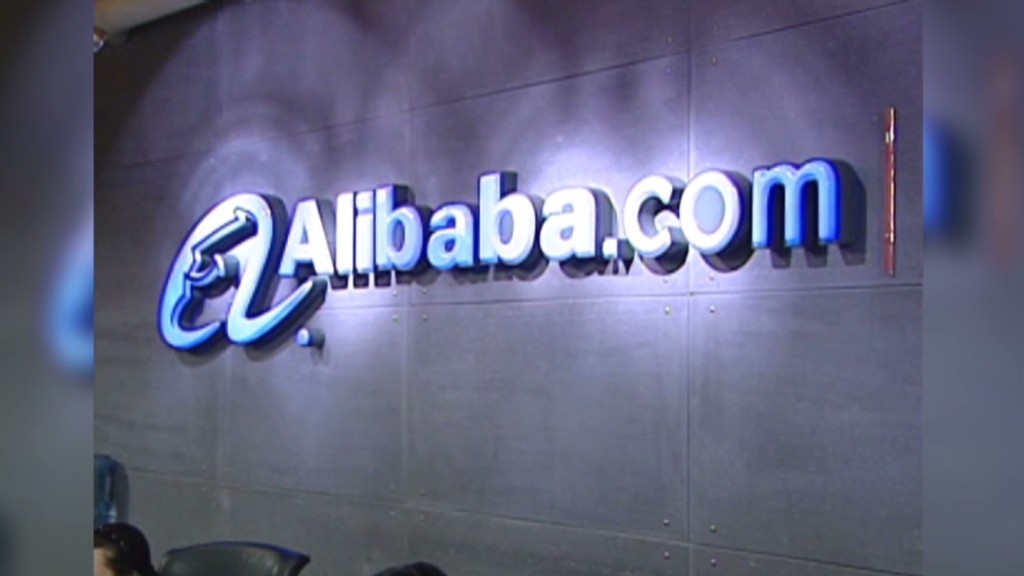
The tech company behind the largest and most-anticipated IPO of the year doesn't trace its roots to Silicon Valley, a Harvard dorm room or MIT lab.
Alibaba was founded 15 years ago in the modest Hangzhou, China apartment of Jack Ma -- a former English teacher who started the company with an initial investment of $60,000 kicked in by 18 friends.
The company has since evolved into the dominant force in China's e-commerce industry, a market with so much potential that Alibaba's IPO may be the largest ever by a tech company -- surpassing even the record $16 billion raised by Facebook.
Here are five things to know about the tech giant:
Alibaba does more than just e-commerce: Alibaba is often described as a combination of Amazon (AMZN) and eBay (EBAY), with some PayPal sprinkled in to boot. But the shorthand fails to capture the breadth of the business model dreamed up by Ma.
By one estimate, almost four out of every five dollars spent online in China are spent in Alibaba's marketplaces.
The company's top two e-commerce sites, Taobao and Tmall, attract more than 100 million unique visitors each day. Estimates put the value of goods sold last year on the sites at $240 billion -- more than eBay and Amazon combined.
Related: Meet four kings of Alibaba's online retail empire
But Alibaba is more than its flagship marketplaces -- it also runs a wholesale operation and a cloud computing business. The company is also linked to a hugely popular digital payment service, Alipay. In a first step into finance, Alipay has started to offer investment funds. Alibaba even operates a taxi-hailing app.
Alibaba has a lock on China: Ever visited Taobao or Tmall? Go ahead and try. The first thing you'll notice is that the marketplaces have little in common with western e-commerce sites.
The website design is distinctly Chinese. Each page is crammed with products in an effort to mimic a crowded Chinese market. Buyers and sellers often use a built-in messaging service to chat with each other, and haggling over prices is standard.
Related: How Alibaba could change American business
Mastery of China's unique market has allowed the company to survive a series of challenges from companies including eBay, which bought Chinese auction competitor EachNet in 2003.
"I know the Chinese user market and users better than [former eBay CEO] Meg Whitman," Ma told the Wall Street Journal in 2005, as he stole market share from the American firm.
The IPO is going to be massive: The initial document filed with the SEC indicates that Alibaba plans to raise $1 billion, but that figure is seen as just a placeholder. Analysts have said it could haul in more than the $16 billion Facebook raised in 2012.
That's really big -- and if it increases further, Alibaba could be a contender for the largest IPO in U.S. history.
Analysts think the whole company could be worth more than $170 billion, and some sky-high estimates are now pushing $200 billion.
Founder Jack Ma is one very rich former English teacher: One of Alibaba's biggest assets is Ma, who has stepped down as CEO but remains chairman of the company. He's known in China as a charismatic leader with a reputation for bold ideas.
Before founding Alibaba, Ma was twice rejected from a teaching college and was even turned away by a local KFC restaurant.
Related: Alibaba founders fund mega charity ahead of IPO
Ma is ranked China's 29th richest man with a net worth of over $4 billion, according to the Hurun Rich List, which tracks wealth in the country. The IPO should boost his bank account.
Alibaba has challenges, too: For all the plaudits, Alibaba is not without blemish. Of particular concern are the number of counterfeit goods sold in its marketplaces, and the company's commitment to sound corporate governance.
Hong Kong is the preferred destination for many of China's top companies seeking to go public, but Alibaba chose to list in New York after Hong Kong regulators refused to allow the company's partners to appoint board members.
The company's SEC filing lists only three directors that will remain as the company begins final IPO preparations: Ma, Alibaba CEO Joe Tsai and Softbank (SFTBF) CEO Masayoshi Son. Alibaba says it will eventually have nine board members, but their identities are not yet known.
Alibaba -- like all tech companies -- must also work to adapt as consumers abandon desktop computing and shift to mobile devices.
In addition, the company must effectively manage relations with the Chinese government, which has not developed clear regulations for some services offered by Alibaba.

